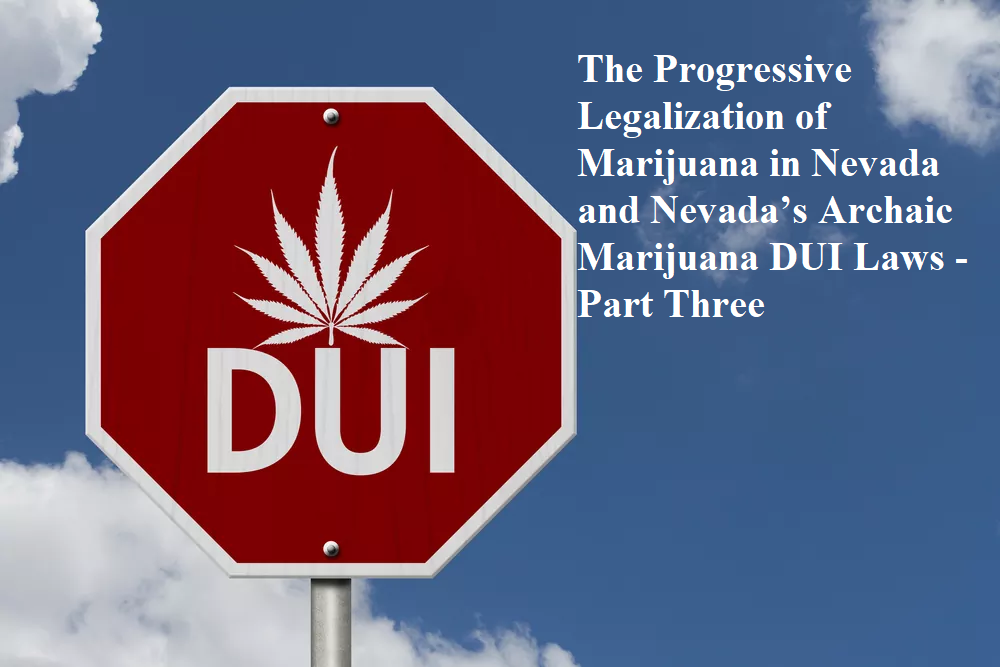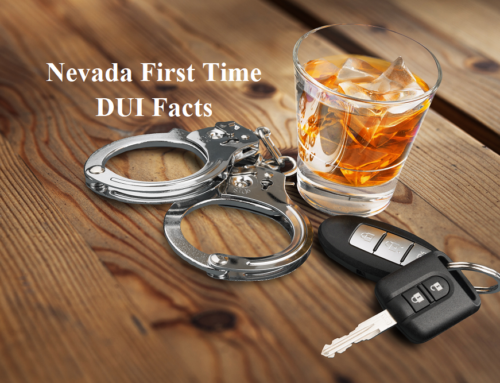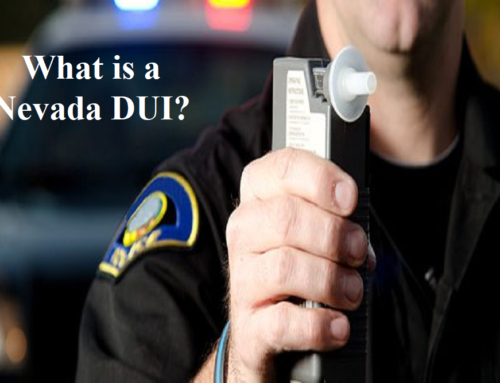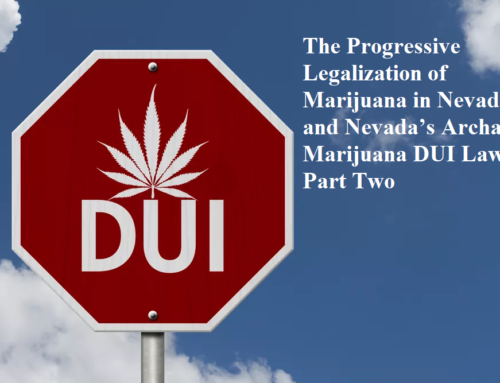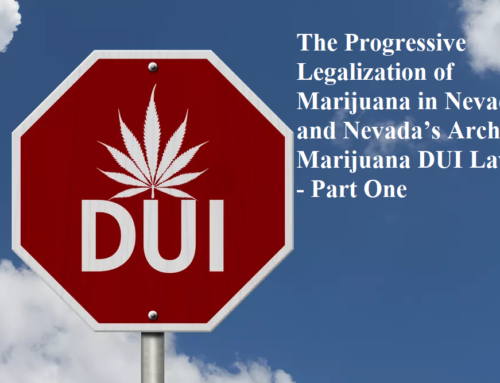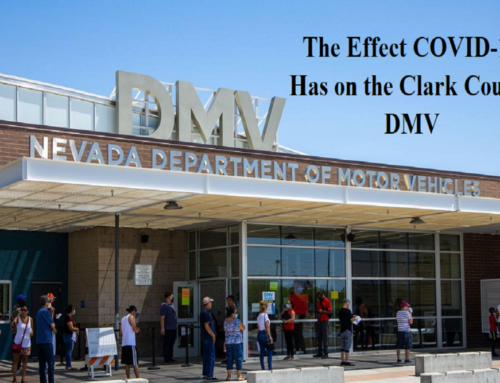***This is part three (3) of a three part article. Part one (1) can be found here. Part two (2) can be found here.***
Marijuana DUI Penalties in Nevada
DUI offenses are obviously very serious. As such, marijuana DUI penalties in Nevada are strict. Even misdemeanor (first and second offenses within seven years) marijuana DUI conviction carries a mandatory jail sentence (2 days to 6 months). Every state has a third-strike DUI law that enhances an otherwise misdemeanor-DUI to a felony-DUI. Nevada’s third-strike DUI law, coincidentally, triggers upon the third conviction within seven years of two other misdemeanor DUI convictions. Third-offense felony DUIs are not probationable and therefore carry a mandatory prison sentence[1] of one to six years. Worse, if the underlying DUI offense is alleged to have caused death or substantial bodily harm to another, the mandatory prison sentence increases to two to 20 years. Moreover, there is no prison-alternative program for felony DUIs that are enhanced because of death or substantial bodily harm. Nevada law defines “substantial bodily harm” as…
[b]odily injury which creates a substantial risk of death or which causes serious, permanent disfigurement or protracted loss or impairment of the function of any bodily member or organ; or prolonged physical pain.
Next, proximate causation in criminal cases is certainly stacked against the defendant. “[A] criminal defendant can only be exculpated where, due to a superseding cause, he was in no way the ‘proximate cause’ of the result.” More specifically, “[a]ny ‘intervening cause must, effectively, break the chain of causation.’” “[A]n intervening cause must be a superseding cause, or the sole cause of the injury in order to completely excuse the prior act.” The Etcheverry opinion is relevant in DUI cases as the “effect [of marijuana] to any extent in contributing to [the alleged harm], no matter how small, may be enough to show proximate cause.” That is not to say that the simple act of driving while impaired, with no allegation of a separate act or omission, is enough to establish causation.
What this Means
The reason I injected causation into this article is to illustrate how absurd Nevada’s current marijuana DUI laws could be applied. Above and beyond the fact that marijuana DUI penalties can lead to an individual being convicted of felony marijuana DUI and sentenced to mandatory prison time simply because they were arrested three times within seven years with a meaningless level of THC in their system (having zero correlation to impairment), Nevada’s felony marijuana DUI laws are scary for marijuana users.
Any marijuana DUI resulting in the death or substantial bodily harm of another immediately exposes the individual to a mandatory, non-probationable prison sentence. Given the above proximate causation law, a defendant “can only be exculpated where, due to a superseding cause, he was in no way the ‘proximate cause’ of the result.” As a result, you or your family member could be subject to a minimum of two years in prison simply because you were involved in a car accident where liability is contested with a random level of THC in your system that has no scientific relevance to the proximity of your smoking to the accident or your impairment. In fact, as demonstrated by the Report, AAA study and Cone Article, you could face this exposure despite not being impaired in the slightest and despite never even smoked or consumed marijuana at all. Think for a moment about how many times we commit traffic infractions in our everyday lives (speeding on the way to court, driving outside the traffic lines when we exit or enter a freeway, etc.) Worse, placing our own conduct aside, when was the last time you almost rear-ended another vehicle because you were cut off? Under Nevada’s current marijuana DUI laws, a person who gets into any type of fender-bender in one of the foregoing scenarios that results in the other driver or a passenger suffering a broken leg or similar injury could face serious marijuana DUI penalties, such as mandatory prison exposure (two to twenty years), simply because they were driving with 2 ng/mL of THC in their system. No prior criminal record is required nor does the defendant’s character come into play. Mother Teresa would face this exposure under Nevada’s current laws. There is absolutely no evidence that this level of THC corresponds with impairment (or even that the person consumed marijuana at all). Nonetheless, the foregoing individual faces a felony charge that is not probationable and carries a two to twenty-year prison sentence.
I tell all of my family and friends that if you are going to legally smoke/consume marijuana, be in close proximity to somebody else that is legally smoking marijuana or even legally smoke/consume marijuana and drive two days later:
[y]ou better be perfect if you decide to drive []. Because if somebody gets killed, if somebody gets hurt, you are criminally liable. Even if you are only one percent at fault. (the foregoing words were the prosecutor’s closing argument in an alcohol-DUI resulting in death case).
Please remember that the foregoing 2017 NHTSA Report was primarily focused on assessing the validity of a per se THC level of 5 ng/mL.
A number of States have set a THC limit in their laws indicating that if a suspect’s THC concentration is above that level (typically 5 ng/ml of blood), then the suspect is to be considered impaired. This per se limit appears to have been based on something other than scientific evidence. Some recent studies demonstrate that such per se limits are not evidence-based. See Report, supra at 28 (emphasis added)
The foregoing is a professional way of saying that state legislatures that have approved marijuana-DUI levels of 5 ng/mL to establish per se impairment are irrational. Nevada’s current per se level for marijuana is 2 ng/mL, 250% lower than a level that the federal government has determined to have no relevance or correlation to impairment.
Closing Remarks
So, you may now legally consume marijuana in Nevada. Congrats. I would like to be able to simply caution you to “imbibe responsibly” just like every alcohol company does in their advertisements. The problem with the foregoing warning, with marijuana, is that it is insufficient. Although you can drink responsibly to avoid criminal prosecution for alcohol-DUIs, there is really no way for you to consume marijuana responsibly (or play poker next to a friend that is smoking responsibly) unless you also forfeit the ability/right to drive. Until Nevada’s marijuana-DUI laws are amended to punish driving while impaired by marijuana, the circumstances will not change.
[1] A citizen facing a felony (third-offense) charge is eligible for the Serious Offender’s Program or Felony DUI Court in lieu of prison time but this option is not guaranteed.
***This article has been broken up into three (3) parts. This concludes the end of part three (3).***

